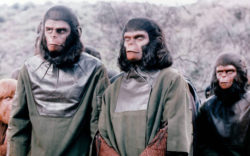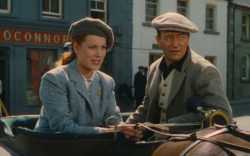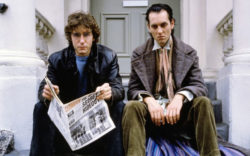With Valentine’s Day approaching, dinner and a movie is a classic way to spend a romantic evening. If you want to paint the town, Frank Capra’s It Happened One Night is playing at Ciné Feb. 10–16 and at Beechwood Cinemas on Feb. 12 and 15. Ciné also screens Park Chan-wook’s wild The Handmaiden starting this week, in honor of the holiday. (See athenscine.com and gtcmovies.com for showtimes.)
For those who prefer a pint of lo mein and staying in with pajamas, we’ve also included recommendations for four other films that take a less conventional view of love.
Go Out and Watch
It Happened One Night (1934) Capra’s five-time Academy Award winner tells the story of heiress Ellen Andrews (Claudette Colbert), who is on the run after eloping. She flees her father’s yacht in Miami by diving overboard, and gets a bus ticket to New York City to be with her new husband. While in transit, she meets reporter Peter Warne (Clark Gable), who sees a potential scoop in chronicling Ellen’s trip. Along the way, of course, they fall in love.
Their love manifests in strange, offensively 1930s ways. Once Peter joins Ellen’s trip, he becomes the only thing protecting her from the ill intentions of other men, including her father’s detectives and a creeper in a fedora. Putting Peter in the protector role almost immediately brings out condescension. When Ellen tries to buy a chocolate bar, he lectures her about her dwindling finances, informs her, “You’re on a budget now,” and tells her to shut up when she objects. He even channels his inner Ralph Kramden, threatening her with bodily harm for the slightest infraction. Since this film is often cited as the birth of the romantic comedy, it is fitting that it contains the birth of a popular trope: one half of the main couple behaving in ways that would get him or her arrested or institutionalized in real life.
Since a one-sided fight is fundamentally boring, the film is at its funniest the few times Ellen fights back. After suffering a transportation setback, the two try to hitchhike. Peter continues his condescension by smugly outlining his strategies for hailing a ride. Cars speed past, leaving him increasingly more desperate and staring at his thumb in disbelief. The reporter trudges back to a nearby fence, where Ellen is lying. Ellen suggests she can get a driver to stop, and Peter laughs in her face.
She walks to the side of the road. A car approaches. She shows her shapely leg. The car stops.
We cut to a shot from the front of this car as it bounces down the highway. The pair sits in the back seat behind an older gentleman. Peter looks depressed, and Ellen beams at him, exhilarated by her victory.
The very optimistic moral of the story is a sentiment J. Lo would appreciate: Love don’t cost a thing. Ellen realizes the depth of her feelings for Peter when he refuses a large reward from her father for bringing his daughter to safety. However, the journey to New York and the movie in general would be considerably more fun for the audience if we were convinced Ellen was actually safe with Peter.
The Handmaiden (2016) Park Chan-wook returned to form last year with this erotic thriller about shifting allegiances—business, romantic and sexual—in Japanese-occupied Korea. There is also a shot from a vagina’s point of view, which I can honestly say I had never seen before.
Stay Home and Watch
Ali: Fear Eats the Soul (1974) German director Rainer Werner Fassbinder shows the unlikely romance between a German maid in her 60s and a thirtysomething Moroccan immigrant. Watch as their love begins to fray under the class and racial innuendo of friends and colleagues.
Annie Hall (1977) In its first scene, Woody Allen’s comedy lets us know that his character’s relationship with the titular Manic Pixie Dream Girl (MPDG) will not succeed. This opening sets the tone for a film that embraces the contradictory illogicalness and desirability of relationships.
In the Mood for Love (2000) Two married neighbors develop a mutual love in 1960s Hong Kong. Conservative social mores of the time—as well as an affair between their spouses—threaten to keep them apart. Featuring emotive, forlorn performances from Maggie Cheung and Tony Leung.
Trust (1990) Long Island auteur Hal Hartley explores a relationship built on mutual admiration and trust—concepts typically disregarded in the idyllic world of romantic comedy—between an electronics genius and a pregnant high-school dropout. Adrienne Shelley continues her streak as the prototypical MPDG of Hartley’s oeuvre.
Like what you just read? Support Flagpole by making a donation today. Every dollar you give helps fund our ongoing mission to provide Athens with quality, independent journalism.










